One decade ago today, the Environmental Protection Agency served a Notice of Violation to the Volkswagen Group for violating the Clean Air Act. The allegation? Volkswagen’s so-called TDI “Clean Diesel” engines actually weren’t so clean, and an apparent cheat device let Volkswagen get away with it for so long. Most of the affected cars have long been fixed, and diesel enthusiasts are still enjoying them. Here is what life is like a decade later with a 2012 Volkswagen Jetta SportWagen TDI, a car that more or less represented the peak of Volkswagen’s “Dieselgate Era.”
The recall that was triggered by the fallout of Dieselgate was a massive operation. Volkswagen recalled 482,000 cars in the United States alone, which were all equipped with corporate Turbocharged Direct Injection (TDI) diesels, and the spread of models was wide.
Everything from the Volkswagen Golf 2.0 TDI to the Porsche Cayenne 3.0 TDI was covered. I remember how TDI owners felt back then. Countless people were absolutely pissed that Volkswagen had lied to them. Others loved their diesels so much that, no matter what happened, they weren’t willing to let their cars go.
But what is it like to have one of these cars now, a whole decade later?
Things Got Wild
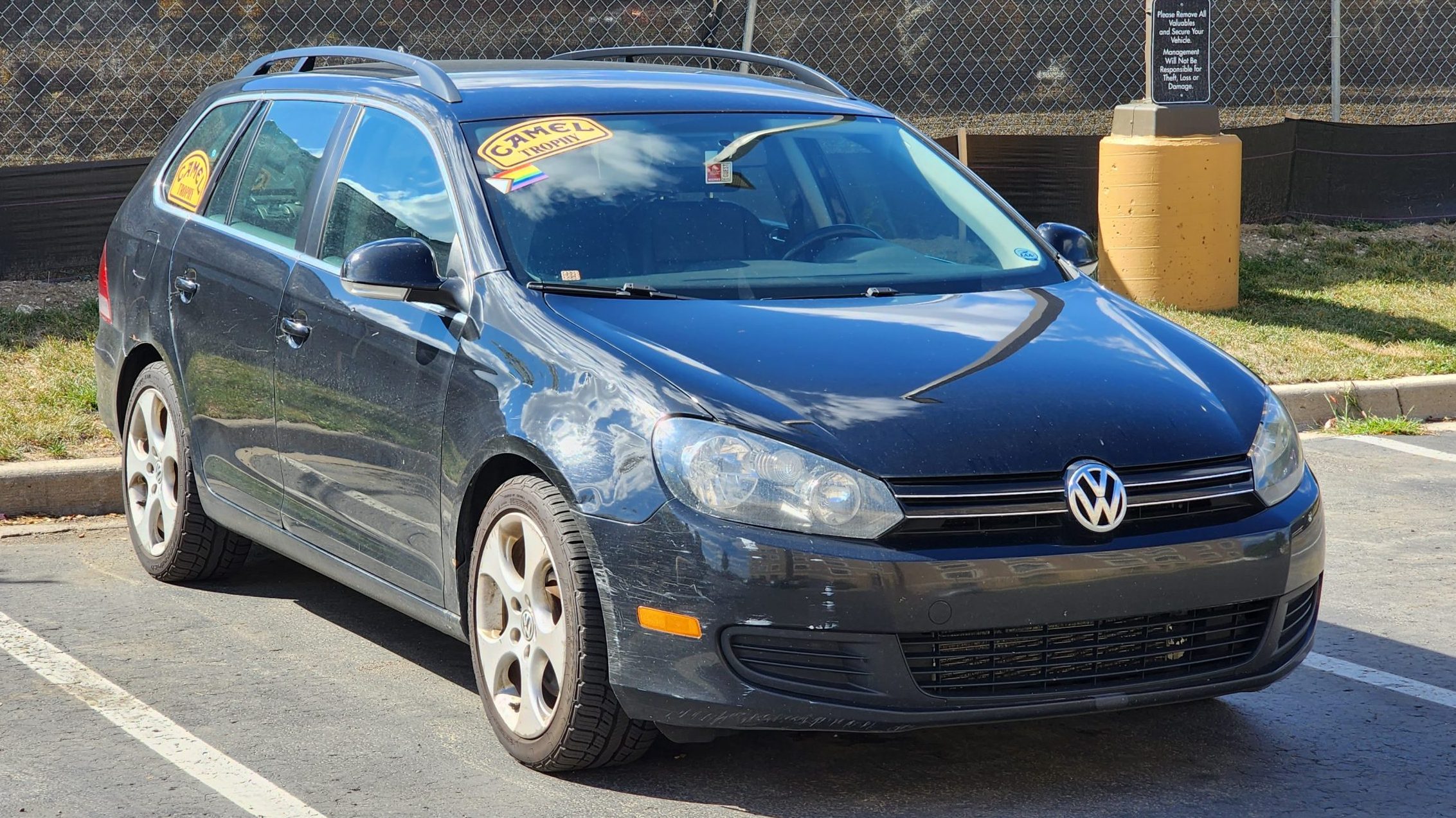
According to the United States Department Of Justice (DOJ), when Volkswagen settled its cases with the DOJ and the State of California, it was told to set aside $10.03 billion. That money was to be spent buying cars back from customers, terminating leases, and fixing the emissions systems of affected vehicles. From the DOJ:
Buyback option: Volkswagen must offer to buy back any affected 2.0 liter vehicle at their retail value as of September 2015 — just prior to the public disclosure of the emissions issue. Consumers who choose the buyback option will receive between $12,500 and $44,000, depending on their car’s model, year, mileage, and trim of the car, as well as the region of the country where it was purchased. In addition, because a straight buyback will not fully compensate consumers who owe more than their car is worth due to rapid depreciation, the FTC order provides these consumers with an option to have their loans forgiven by Volkswagen. Consumers who have third party loans have the option of having Volkswagen pay off those loans, up to 130 percent of the amount a consumer would be entitled to under the buyback (e.g., if the consumer is entitled to a $20,000 buyback, VW would pay off his/her loans up to a cap of $26,000).
EPA-approved modification to vehicle emissions system: The settlements also allow Volkswagen to apply to EPA and CARB for approval of an emissions modification on the affected vehicles, and, if approved, to offer consumers the option of keeping their cars and having them modified to comply with emissions standards. Under this option in accordance with the FTC order, consumers would also receive money from Volkswagen to redress the harm caused by VW’s deceptive advertising.
Consumers who leased the affected cars will have the option of terminating their leases (with no termination fee) or having their vehicles modified if a modification becomes available. In either case, under the FTC order, these consumers also will receive additional compensation from Volkswagen for the harm caused by VW’s deceptive advertising. Consumers who sold their TDI vehicles after the VW defeat device issue became public may be eligible for partial compensation, which will be split between them and the consumers who purchased the cars from them as set forth in the FTC order.

The recall and buyback process got insane at times. The EPA’s Consent Decree said that cars eligible for buybacks had to be “operable,” and many TDI owners tested the limits of that by stripping their cars down to only their most critical components before turning them in. During Dieselgate, prices for used TDIs fell. Some folks got clever and bought cheater diesels for cheap and then turned them in for the buyback, raking in thousands in profit in the process.
The chaos was something fascinating to watch. I remember seeing parking lots full of captured TDIs, just waiting to be fixed. Eventually, Volkswagen churned through the backlog, fixed the cheating diesels, and put them back on the market, complete with a great warranty. Despite the cheating and everything that happened, people rushed to buy the fixed diesels while they could. As I wrote in 2022, the buying frenzy was so crazy that some of the last TDIs ever assembled for the American market, the Volkswagen Touareg V6 TDI, were being listed for more than sticker price. In one case, I found a 2016 Volkswagen Touareg TDI for sale for $73,900, or nearly $24,000 over sticker.
A Decade Later
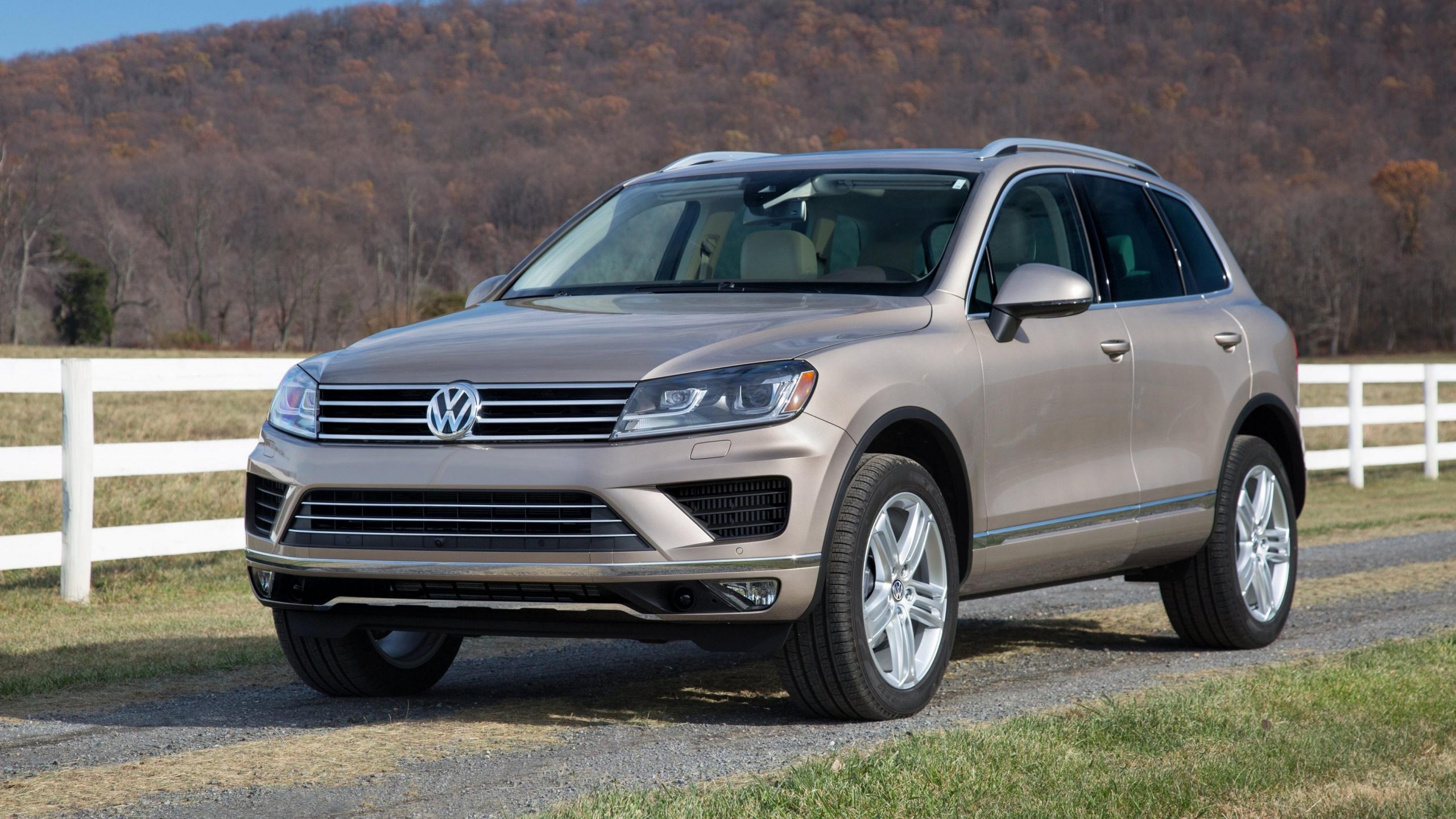
But the mad rush eventually ended. Everyone who wanted a TDI got one, and Volkswagen took its lickings. In the years since Dieselgate, diesel cars went from being the standard fuel for most passenger vehicles sold in Europe to being a niche with a low single-digit market share. Here in America, Volkswagen pulled diesel out of the market entirely, and save for one last gasp of compression ignition power thanks to General Motors, Mazda, and a few others, diesel cars are no longer sold here.
Today, Volkswagen TDIs no longer have mainstream appeal in America. Hybrids get the same fuel economy, and EVs now have green cred. I would argue that most TDI owners in America today are probably enthusiasts, or at least people who consciously like diesel. That wasn’t necessarily the case in the past, when Volkswagen pushed diesel as something to drive if you liked the environment.
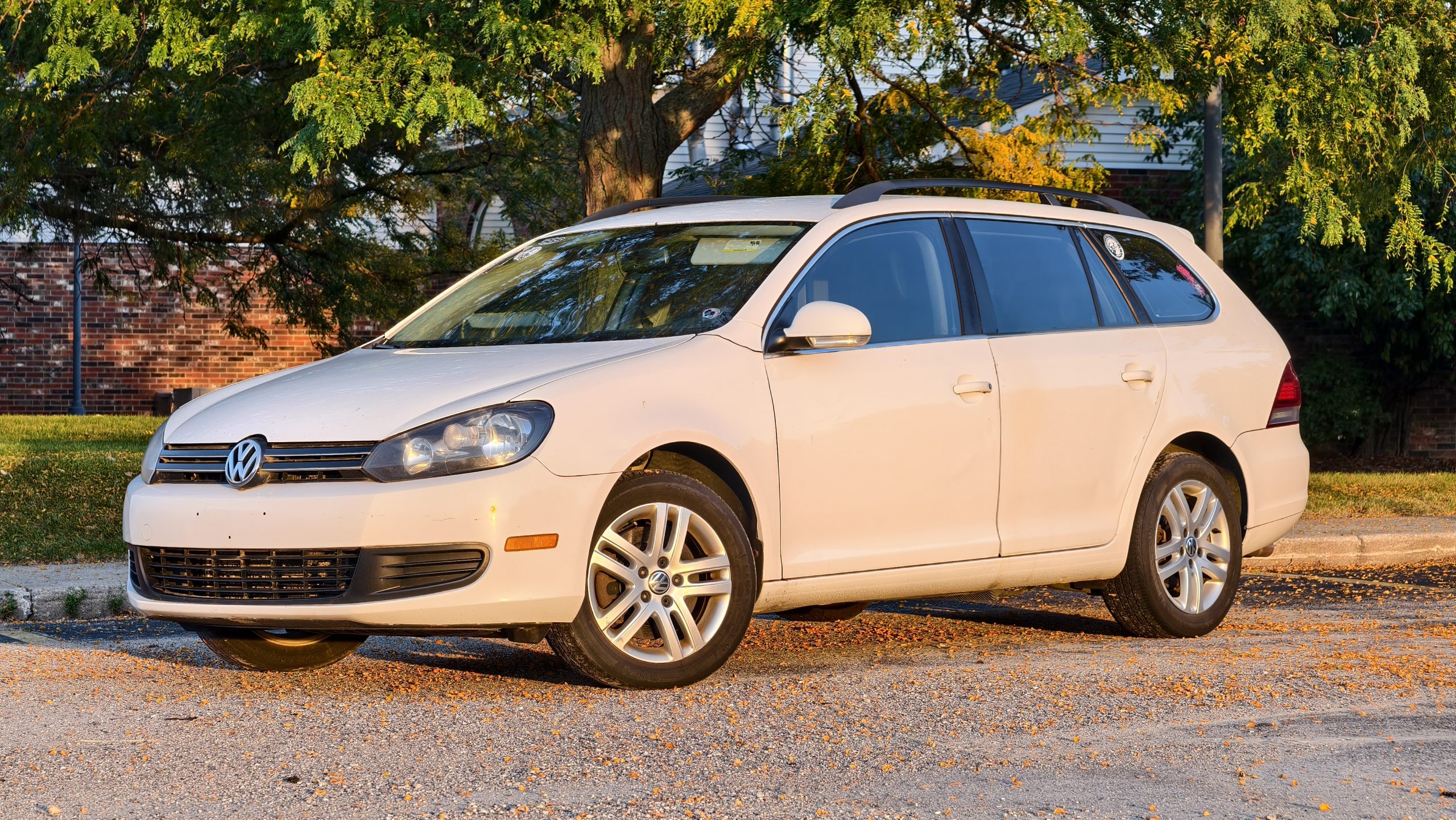
I bought my first cheater diesel in the summer of 2020. My car, a 2012 Volkswagen Jetta SportWagen TDI, was purchased new in Wisconsin. The first owner then hit the pavement, putting down some incredible miles. How many? When he took the car to get the Dieselgate fix in August 2018, the car already had a whopping 294,910 miles. For those of you doing the math, the original owner of my car drove it about 49,100 miles a year!
The cool thing about the Dieselgate extended warranty coverage is that it lasts for four years or 48,000 miles from the date of the fix. So far as I can tell, the original owner of my car gave the vehicle to an immediate family member in December 2019 when the vehicle had 340,000 miles. That person then drove the car about 12,000 miles before selling it to me in 2020. Technically, even though the car had been fixed for only two years, it had driven about 56,000 miles from the Dieselgate fix, and so it was no longer covered under the warranty. In my care, the car has lived a much gentler life, moving only about 3,000 miles. Granted, most of that is due to the nightmare I went through to get a title for the car.
So, what’s it like to own a Dieselgate-era car long after Volkswagen has moved on?
Peak Diesel Jetta

The Volkswagen Jetta SportWagen TDI technically has a weird history. The fifth-generation Jetta launched in 2005, and its design retained the general shape of the famous MkIV that came before, but rounded it out. Meanwhile, Volkswagen chased a more premium market with the interior. Volkswagen was big on technology with the MkV, and buyers were treated to features like optional dual-zone climate control, active head restraints, emergency brake assist, electric power steering, and Volkswagen’s Direct-Shift Gearbox (DSG) dual-clutch transmission. A previous story that I wrote continues:
The list of engines was pretty interesting, too. The base engine was a 2.5-liter inline five that made 150 HP. I like this engine because, with the right exhaust, it sounds like a baby Lamborghini. The aforementioned 1.9-liter diesel was still around and if you wanted Golf GTI power in a sedan body, you could opt for your Jetta to have a 2.0-liter turbocharged four making 200 HP. The Jetta GLI further offered some sporty bits like plaid seats, sport suspension, and sweet 17-inch wheels.

Now, things get sort of confusing with the wagon. At first, the MkV Jetta was sold only as a sedan, then Volkswagen teased the Jetta SportWagen in 2007. America would finally get the Jetta SportWagen in 2009. Here’s the fun part: Despite visual similarities and badging, the SportWagen technically isn’t just a long-roof Jetta. Instead, the Jetta SportWagen is actually a rebadged Golf wagon. Yes, the Jetta and the Golf are largely similar and ride on the same platform, but the Jetta was a little softer and a little more U.S.-centric than the Golf. But that’s the fun way Volkswagen decided to give the Jetta a wagon variant in America.
The body of the SportWagen remains seriously attractive even today. It doesn’t look angry, isn’t filled to the brim with creases, and looks just as good parked at a fancy resort as it does in front of a Walmart. Personally, I think these wagons look sharp with a set of ‘Detroit’ wheels. Unfortunately, the downside of these Jettas is that they love to rust. I used to own two of these SportWagens, and I sold my other one, which had 120,000 fewer miles, because rust had eaten away the tailgate, one door sill, and had been working a number on the rockers.

These particular vehicles were covered by a 12-year rust warranty, but in my experience, the warranty might not be honored unless the rust perforates the panel. Sadly, my 2012 is finally showing bad rust in one area, but it’s too late, as the warranty has now expired.
The interior of the SportWagen continues the sort of no-nonsense theme of the exterior. My car, which doesn’t have any of the Jetta SportWagen’s fancy features like real leather, a glass roof, dual-zone climate, navigation, or anything like that, is pretty comfortable inside. The seats are trimmed in perforated V-Tex leatherette, and the dashboard is of a somewhat soft-touch material.
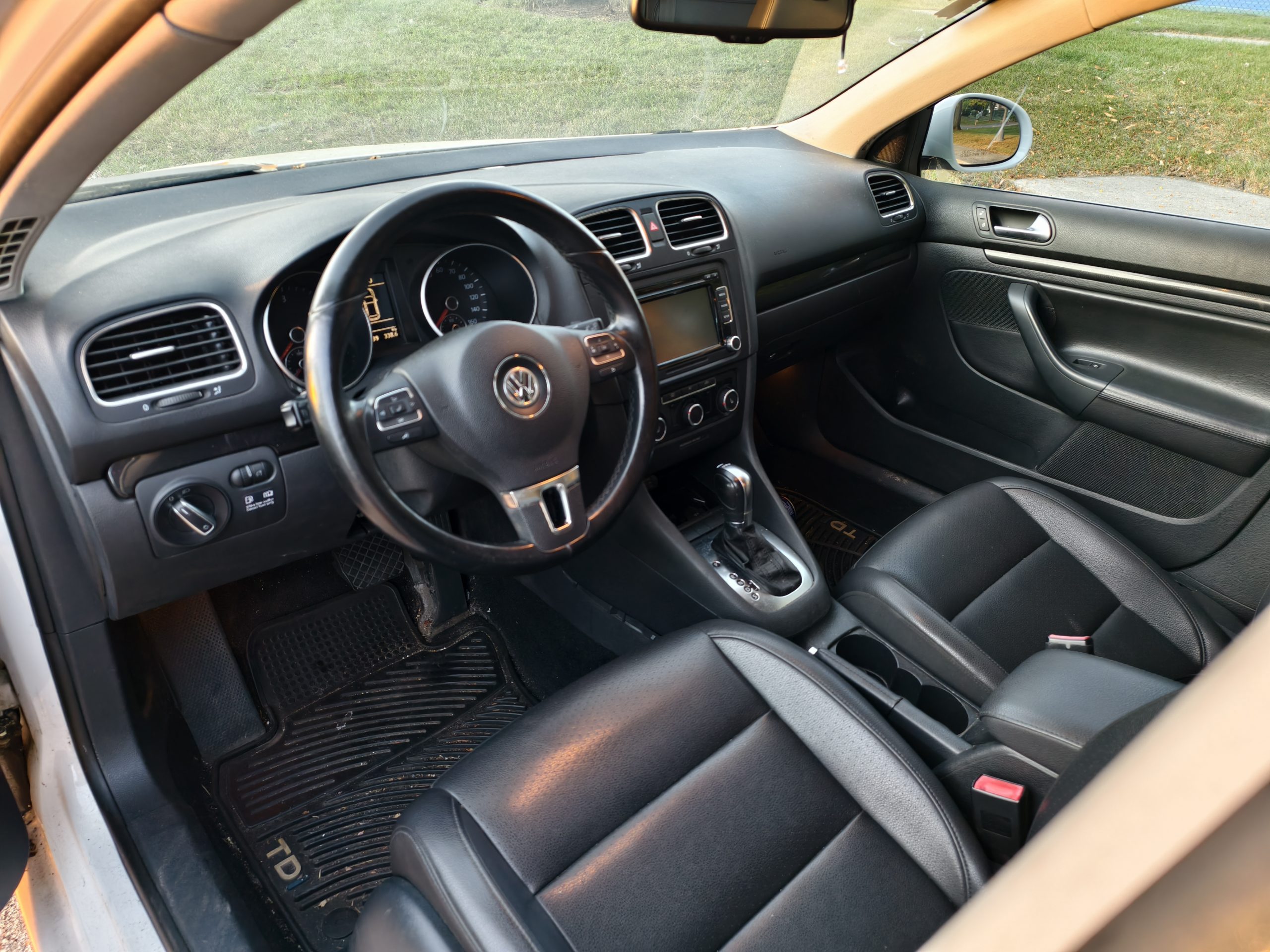
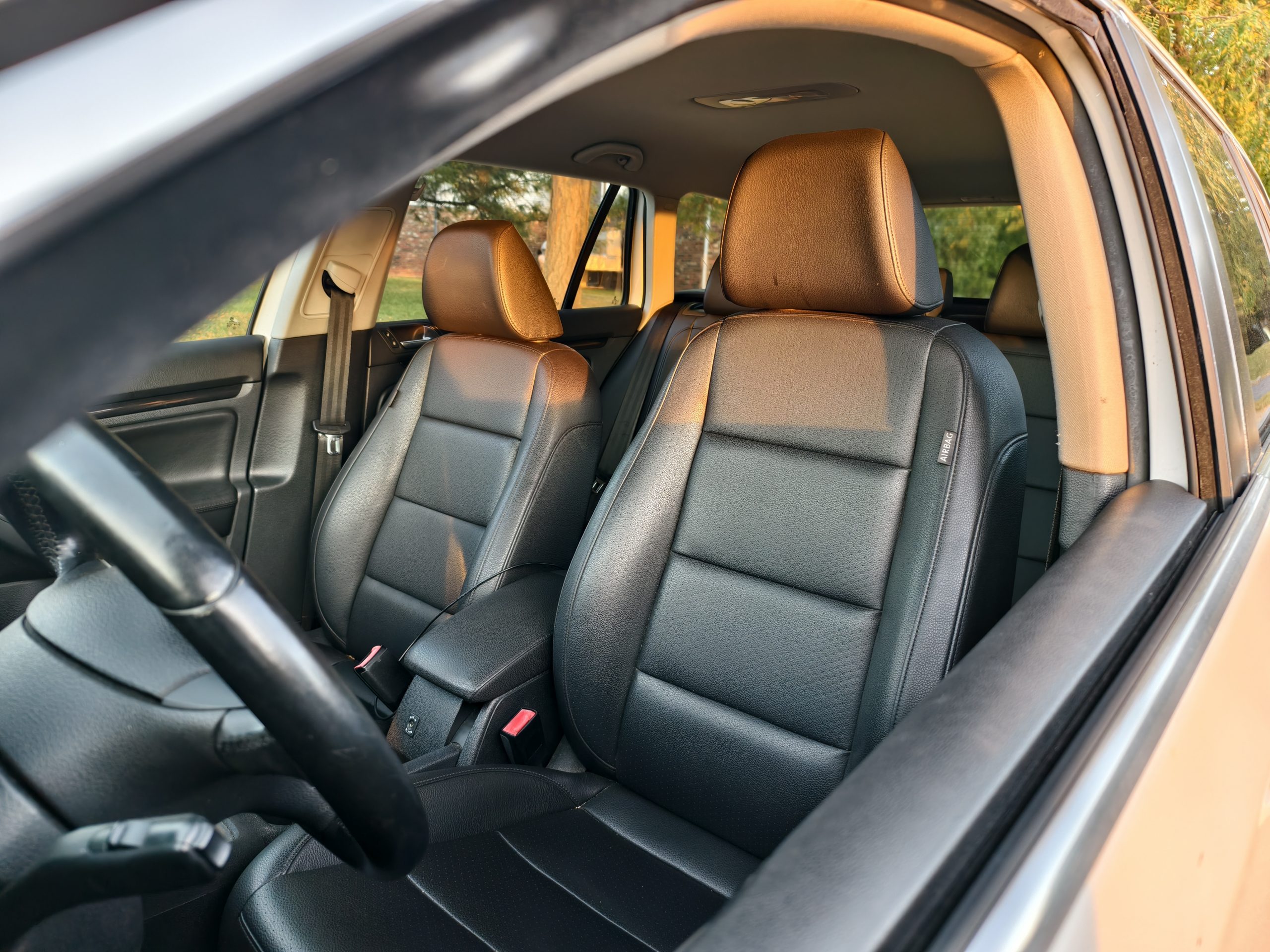
Either way, it feels pretty pleasing to the touch, even 13 years later. I have driven one of these diesel wagons non-stop from Chicago to Orlando and love the comfort of these seats. The passengers that I’ve carried also haven’t had any complaints.
Something I like is that there are just enough features to make the car feel modern, but not overdone. The front seats are heated, I can stream Bluetooth music through the stereo and its 10 speakers, and I could even rock SiriusXM Satellite Radio if that’s something I cared about. If that’s not enough for you, the SportWagen was also sold in a higher trim with the features that I mentioned above. However, for me, I’m okay with not having a glass roof as I don’t have to worry about the water leaks that are oh so common with aged German cars.
The Goods
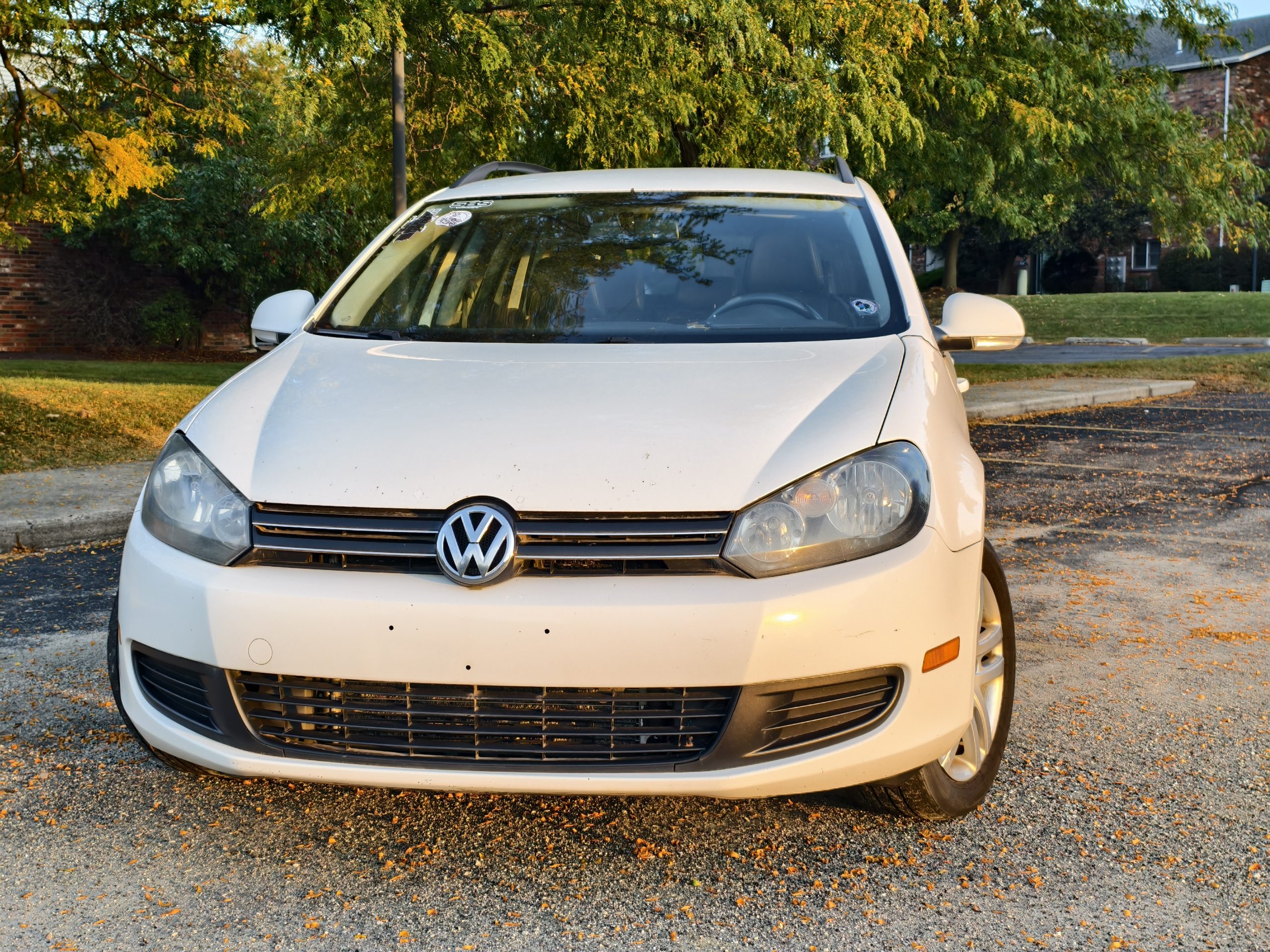
Under the hood sits a 2.0-liter CJAA common rail four-cylinder turbodiesel engine. This mill makes 140 horsepower and 236 lb-ft of torque, which is transmitted through either a six-speed manual, or a six-speed DSG. Volkswagen said that with the diesel engine, SportWagen owners got up to 39 mpg highway with the DSG and 42 mpg highway with the six-speed manual.
The only other engine choice for most of the SportWagen’s run was the 2.5-liter straight-five, which was good for 170 horsepower and 177 lb-ft of torque, and sounds like half of a Lamborghini. For just a single year, 2009, there was also the Volkswagen Jetta SportWagen SEL 2.0T, which packaged the SportWagen with the 2.0-liter 200 HP turbocharged four from the Golf GTI. That year, Volkswagen had reported that 81 percent of SportWagen sales went to the diesel model. Technically, this is one of those weird situations where the gas model is the rarer version.
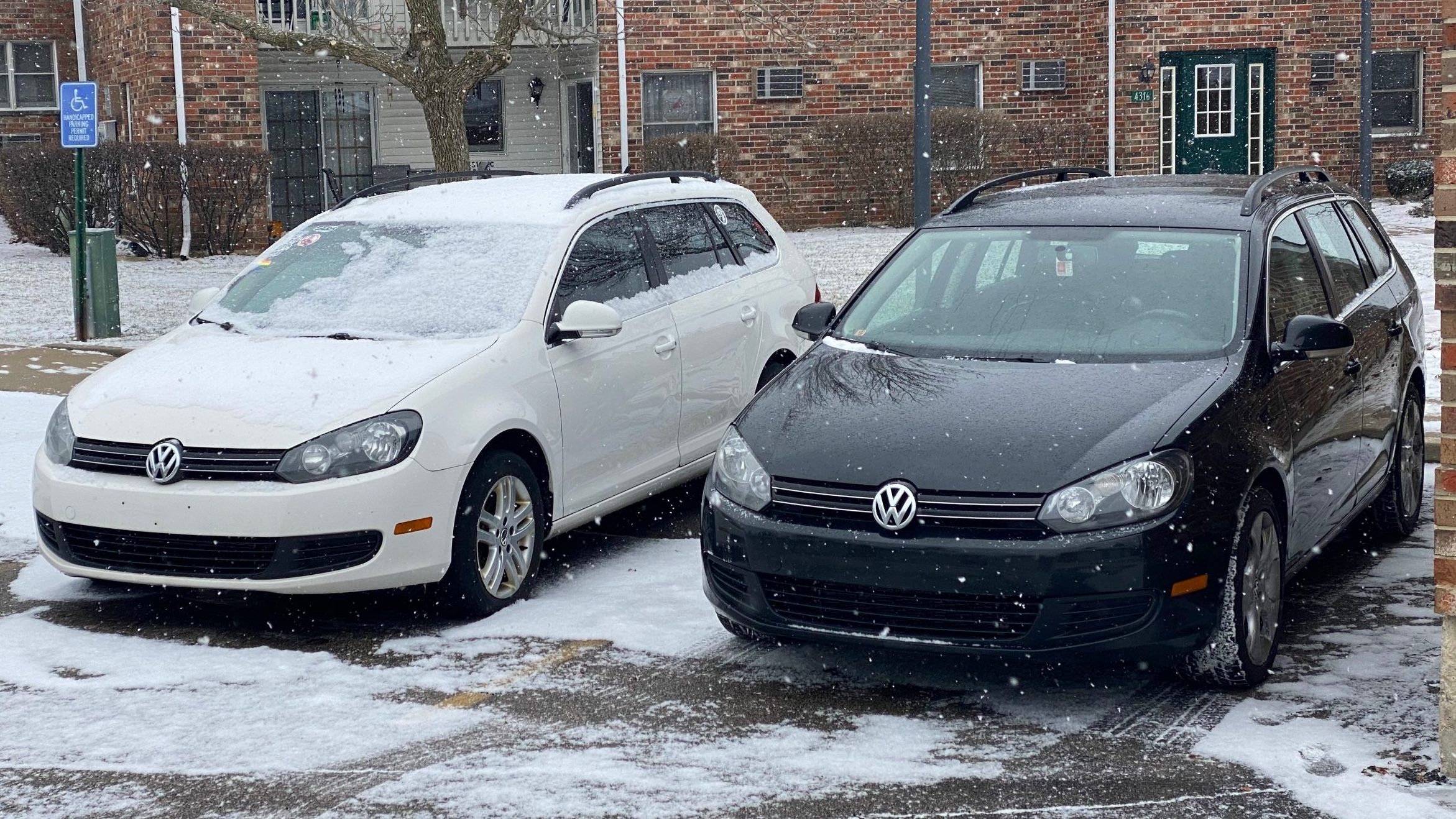
Because I’m weird, I owned both a DSG model (white) and a six-speed manual (black) version at the same time. Both cars even had the exact same options, but the six-speed had slightly larger 17-inch wheels as opposed to the 16-inch wheels found on the DSG model.
On the road, both of these cars are great to drive. Their suspensions, MacPherson struts up front and a multi-link setup in the rear, are just firm enough to handle the car through turns, but not so harsh that I can’t enjoy a long trip. Body roll is present, but well-controlled and, even in my two high-mile examples, remains composed even when sending the car through twisty and destroyed roads in the Midwest. Like most front-wheel-drive cars, the limits are pretty predictable, too, and getting too excited is met with understeer. I bet with the right tires and a sporty suspension upgrade, you can turn one of these wagons into a sort of discount diesel GTI. Okay, maybe if you squint a bit.
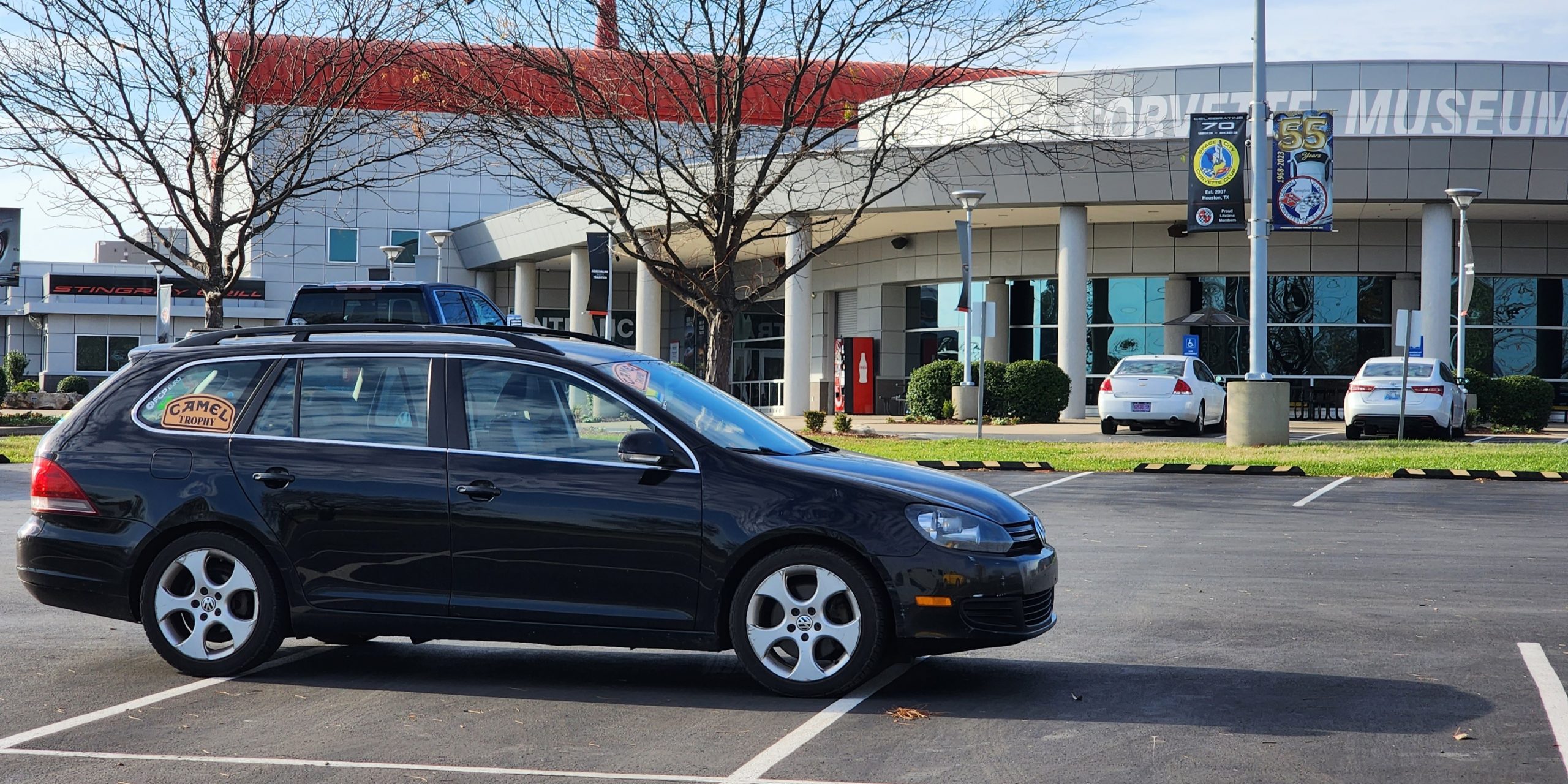
When I don’t send the SportWagen through curves, I find that these wagons are pretty quiet. Now, these aren’t luxury cars, so don’t expect a library. Tire noise is what I associate the most with the interiors of these vehicles. But it’s not too bad. Again, I’ve driven these far and wide without stopping and have felt pretty good upon arrival.
The diesel complements the experience. At launch, the low-down torque is more than enough to break the tires loose, which makes me giggle because I’m a hooligan at heart. This doesn’t necessarily translate to speed. In MotorWeek‘s hands, the SportWagen TDI hit 60 mph in 8.9 seconds. That’s quick for a diesel, but slower than many more sporty cars. Check out the review:
Transmission choice makes a pretty big difference. The six-speed DSG is lightning quick, buttery smooth, and effortlessly chooses the right gear for most situations, but not at all engaging. I found the manual to be much more fun to drive. However, the manual in mine, or at least in my 230,000-mile example, wasn’t particularly impressive. It was accurate, sure, but not very clicky, and it didn’t have as much feel as I like to have in my shifters. Again, this car was pretty old, so some of that was absolutely due to wear.
Both of my cars managed to get similar fuel economy, with both scoring between 42 mpg and 45 mpg, depending on driving conditions. Do the math, and that’s over 600 miles on a single tank of diesel, and you bet that I challenged myself to drive that distance without stopping.
Diesel Emissions
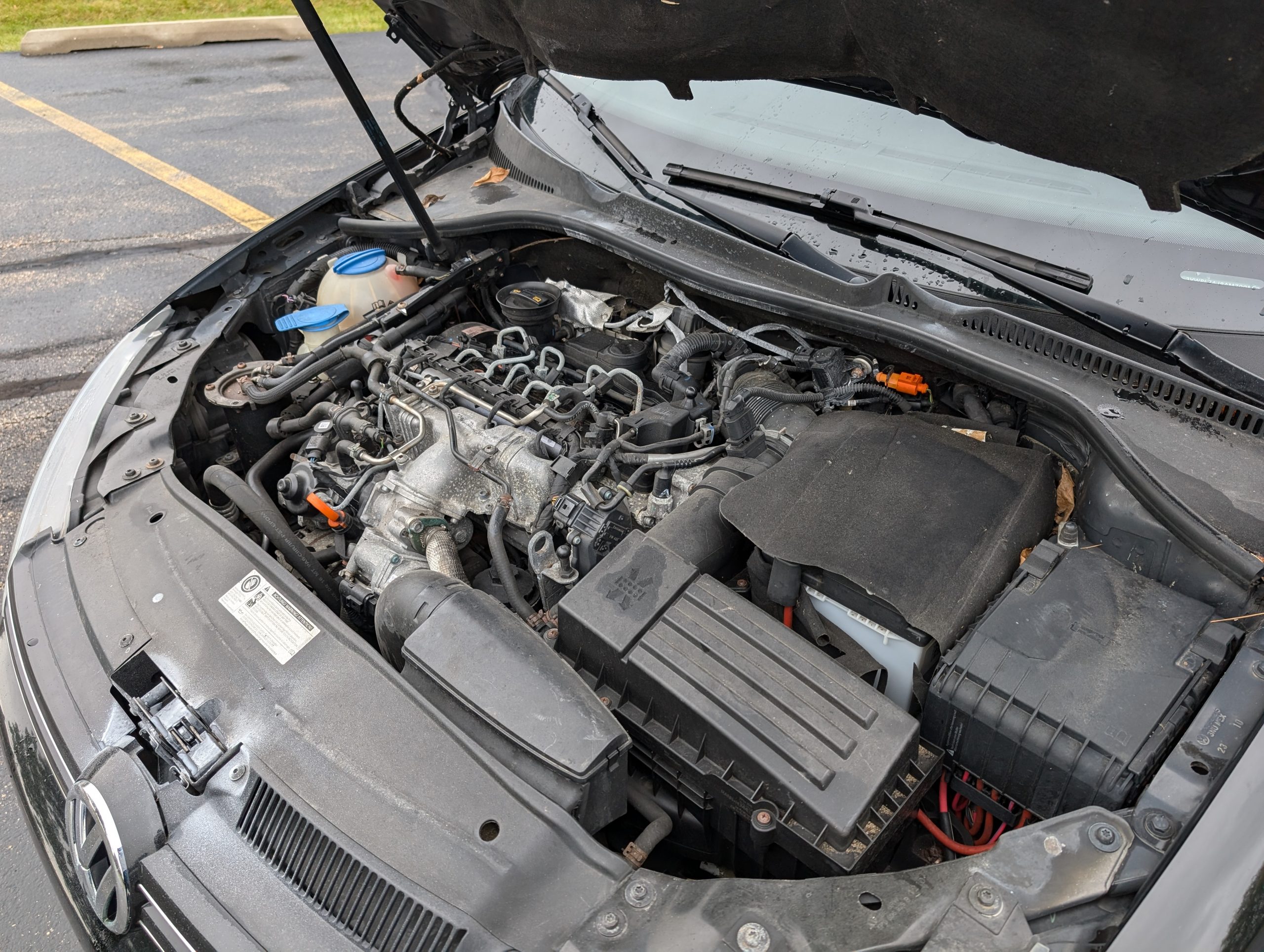
The powertrains of my two examples also suffered from a couple of interesting problems. My 2010 example, which had the six-speed manual, more rust, and 230,000 miles, suffered from a cracked diesel particulate filter (DPF). Essentially, the honeycomb structure within the DPF cracks and sends soot through. A common issue that occurs after DPF failure is the clogging of the EGR cooler. Ultimately, so much soot can get through that your tailpipe will turn black, and your car might even belch some smoke on acceleration. That’s what my 2010 SportWagen did after its DPFs cracked. In many cases, the car will actually drive ok after a DPF crack, and at least early on, your only indication might be an illuminated check engine light and codes for insufficient EGR flow. In my case, my fuel economy also went down to about 40 mpg.
There is an unconfirmed theory that since the emissions fix causes the car to actually utilize its emissions equipment as it should, this equipment is now more prone to failure in fixed vehicles. There are forum threads of enthusiasts tracking emissions equipment failures, and it does seem that there could be a kernel of truth to the theory. I suppose it does make sense, since before the Dieselgate fix, the cars were allowed to pollute more than they should have.

My 2010 also had a turbo boost problem that I wasn’t able to figure out. At speeds of between 73 mph and 83 mph, the car sometimes went into limp mode due to underboost. My car’s turbo actuator arm was corroding, so that could have been the issue. The car also could have had a vacuum leak. I sold it before I diagnosed the exact cause.
On the other hand, the 2012’s emissions equipment and turbo have been flawless despite so many more miles. The service records that I have even suggest that it hasn’t been to the dealer for an emissions problem after the Dieselgate fix. I haven’t seen its check engine light illuminated when driving. Instead, the problem that this car had was that its timing belt was actively cracking, and the dual-mass flywheel was failing. I had a new timing belt, dual-mass flywheel, and water pump fitted and haven’t had a problem since. The one issue that the car is suffering from right now, aside from bald tires, is a right front wheel bearing that has only just started to make noise.
Peak Volkswagen
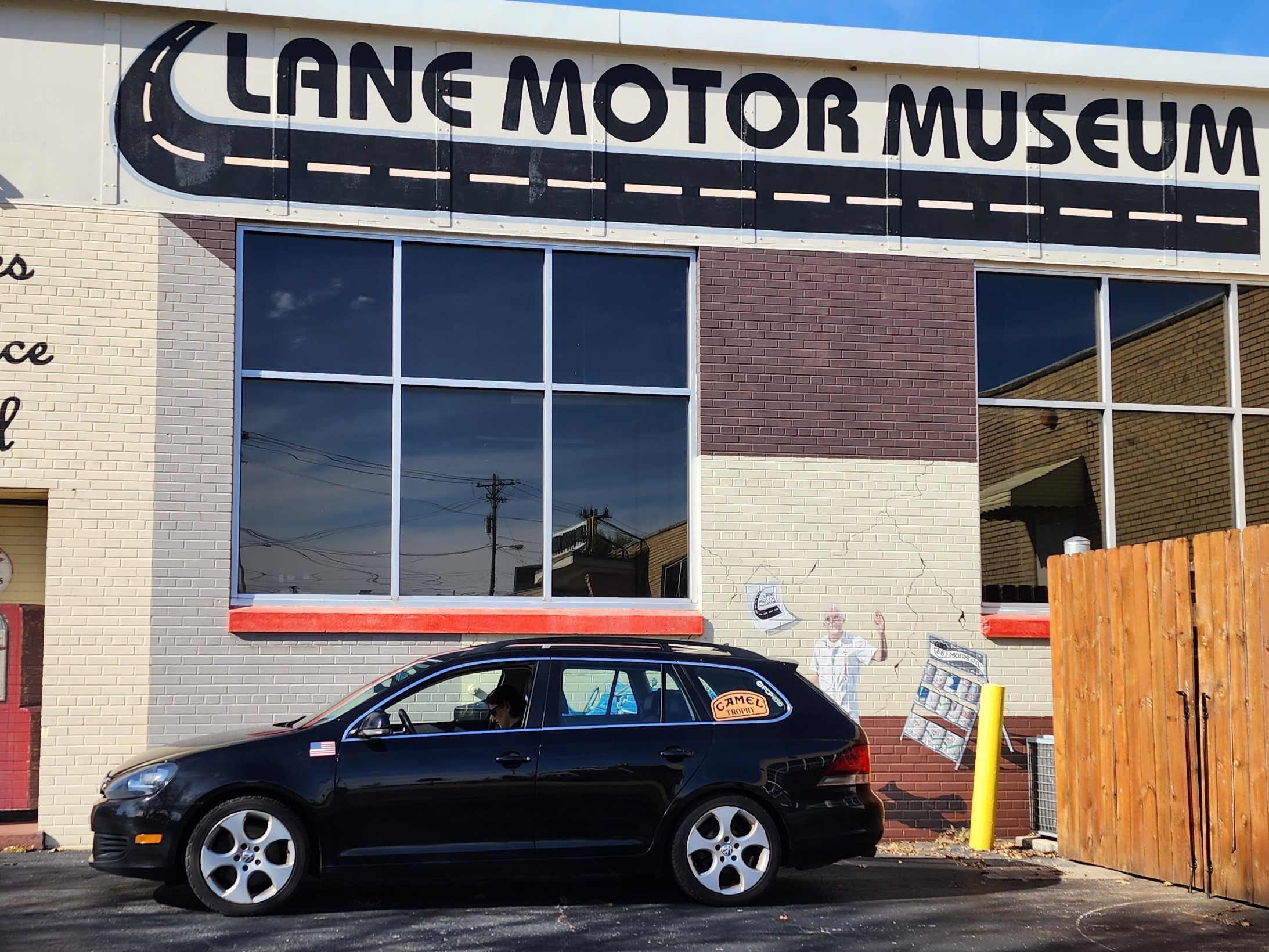
In a way, these SportWagen TDIs, and their newer Golf SportWagen TDI counterparts, represented the peak of the Dieselgate era. My car was built before Volkswagen started adding diesel exhaust fluid systems, and it was made right there in that time when Volkswagen really pushed “TDI Clean Diesel” to surprising success. For a moment in time, diesels made up nearly a quarter of Volkswagen of America’s sales, and Volkswagen was enjoying the spoils so much that other automakers tried to get in on the market. I still wonder if Mazda, which spent nearly a decade trying to perfect a diesel for America, knew that Volkswagen wasn’t playing with a fair deck.
I suppose that makes this car sort of bittersweet. The SportWagen was made at a time when diesel was still seen as great, and when Volkswagen took the credit for making diesel “clean.” They were fun cars that you could enjoy without guilt. People absolutely adored these cars, and for good reason. What’s more peak Volkswagen than making a manual diesel wagon that you could buy in the color brown?
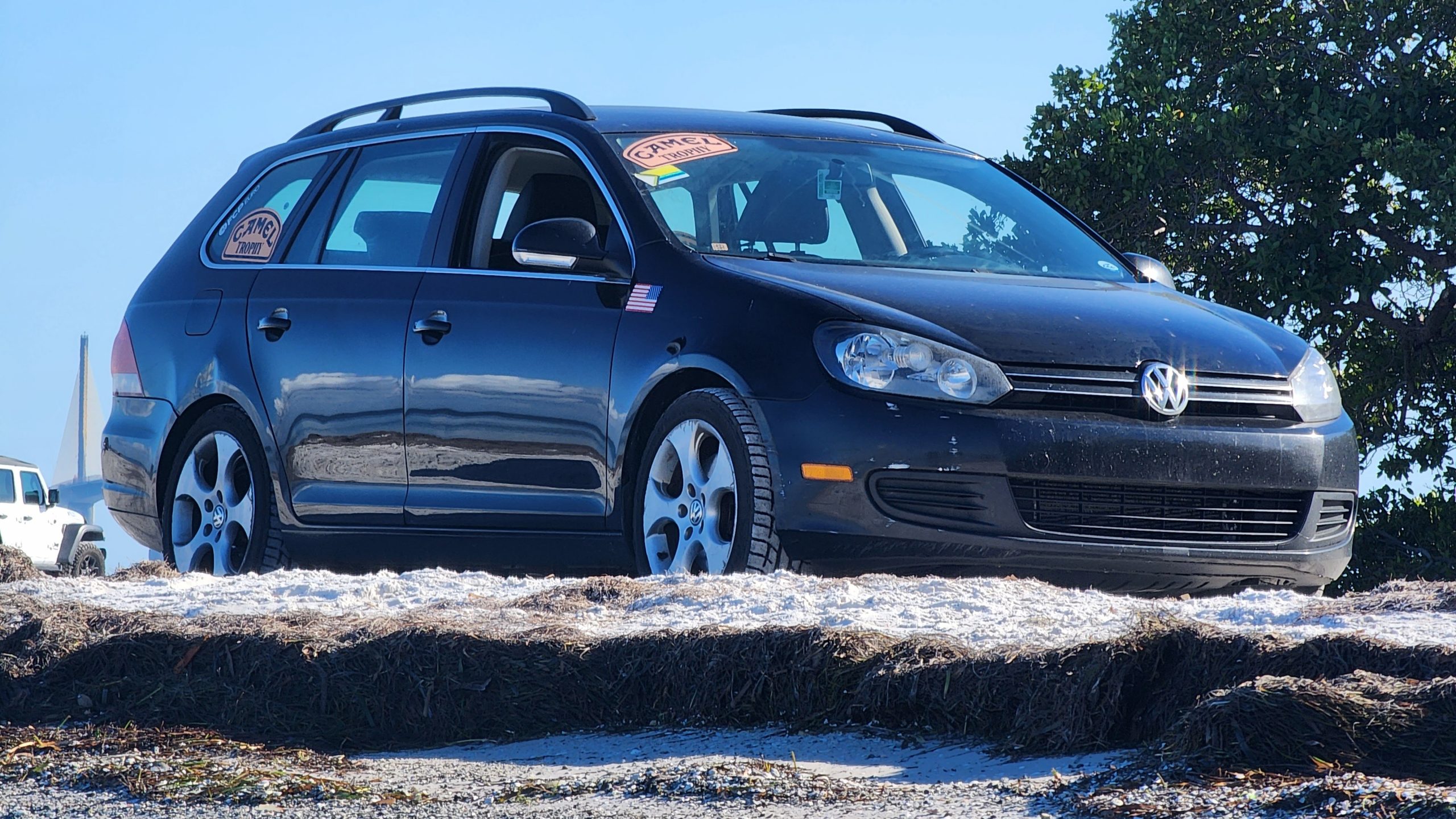
Yet, at the same time, these cars now represent one of Volkswagen’s dark eras, one where it lied to the public about a subject as serious as harmful emissions. The fixed diesels drive just fine and don’t pollute like they used to, and people still love them. But they’re now tainted–possibly forever–by Dieselgate. Volkswagen, as well as much of the world, has turned away from diesel and has moved on to EVs. My SportWagen is now a dinosaur from another time.
If you’re a fan of diesel and the weight of Dieselgate isn’t stopping you, I’d still recommend buying one of these cars. They’re still great all of these years later. They regularly get more than 40 mpg, and they can still be reliable. Volkswagen TDI fans are still driving and modding them, too. Just make sure you buy one from a place that doesn’t know what rust is.
All photo: Mercedes Streeter

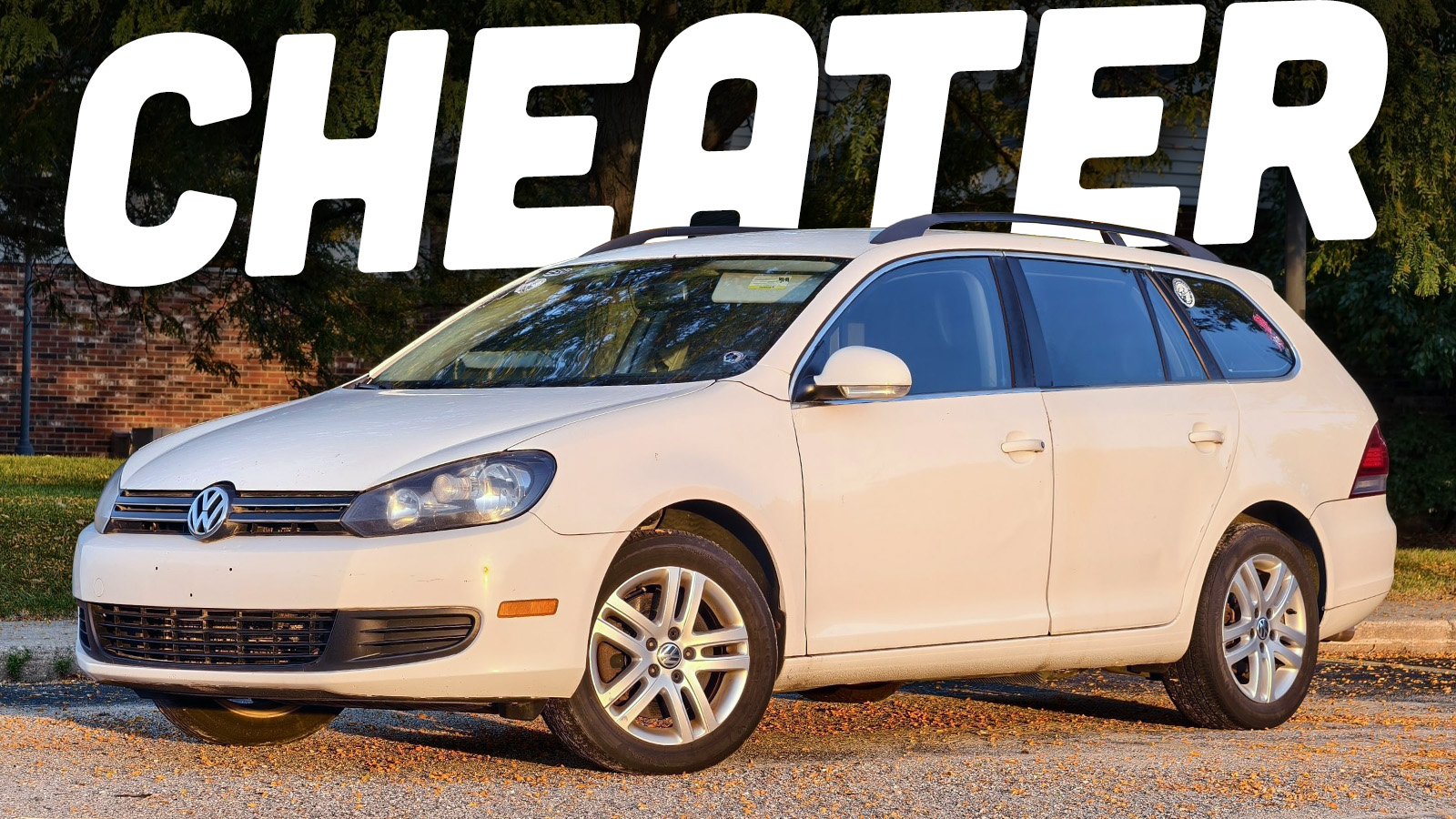







We had a 2003 Jetta Wagon TDI that we really liked and went 250K mostly trouble-free miles in 10 years. We didn’t replace it with another TDI because the wagons were going for $40K and that was simply too much for a basic commuter car.
Dieselgate comes around and suddenly in 2018 I can buy a loaded CPO 2014 TDI Wagon for $14K with only 33K miles with an extended warranty on all the emission equipment! Sounded to good to be true but we bought one – and regretted it. In general it was an OK car but underpowered without the great fuel economy of the 2003. That 2003 averaged 47 mpg in mixed driving and returned low 50’s at 75 mph on the highway. The 2014 averaged 37 mpg and only managed low 40’s mpg at 65 mph. With diesel averaging 20 – 25% more per gallon vs 87 octane there was no fuel savings but it was a nice sized wagon which is very hard to find in the USA.
Then the problems started. The first time we opened the “panoramic” moonroof it ripped the seals off. Seems that cooking in a Nevada desert for a few years isn’t good for rubber components. CPO warranty fixed it but the repair took 4 days. The biggest problem was with fueling. Randomly after just starting to accelerate it would almost stall, then after a half second or so recover, spin the tires and take off. Made pulling out on traffic lots of fun because I never knew if it would accelerate as normal or almost stall in a lane of traffic. Took it to the dealer twice, was told by the mechanic that he know exactly what was causing the problem but unless he personally witnessed the issue the dieselgate warranty would not cover the repair (which was more than $1000). Instead I got charged a $150 “diagnostic fee” each time. It would also ice up the intercooler in the cold humid winters here in the PNW – which there was a technical service bulletin covering the issue. Again, the dealers (I went to multiple) said unless I had it towed in hydrolocked VW would not fix it per the TSB. At that point I was done with the car and done with VW. Sold it to CarMax in 2021 for $16500 and will never touch a VW again. My wife has an Acura TSX Wagon today.
I owned a white 2012 Jetta Sportwagen TDI (special order because I wanted a slicktop with a 6MT) up until the whole dieselgate shit hit the fan. I turned it in, flipped the refund, and purchased a 2015 Mk7 Golf Sportwagen TDI SE for an additional $1200. The Mk7 has been a family hauler, commuter car for my daughter during high school and college, and now that we’re empty nesters, a farm, garden, and dog-hauler.
The Mk6 was a little more fun due to the more sophisticated rear suspension (Mk7 TDI gets a torsion bar rear end due to the DEF tank), manual transmission, and the cheater emissions setup, but the Mk7 acquits itself well.
I am probably one of the few (only?) people that tracks my ’14 TDI Sportwagen. Since the underpinnings are the same as the Golf/GTI/Jetta, all the go fast suspension bits for those platforms fit right in. It is slow on the straightaways but she is quite fun through the twisties. I get tons of people at the events that come up to me and are genuinely surprised that it’s a diesel.
Speaking of diesels, you guys are missing out on the BMW 320d. It gets 50 mpg on the highway and handling is immaculate.
It costs more to maintain than the Golf/Jetta, but I’d argue it’s directly proportional to the amount of increased comfort and power you get in return.
Obviously some car enthusiasts “hate” it because they think it’s their beloved B58 being taken out and replaced with a 2.0L diesel. Instead, if you ignore the badge, it’s a decent RWD sedan that’s very efficient.
It’s still just a car. I drove a dieselgate 2012 Passat TDI SEL for 6 years. If no one had ever mentioned the scandal, there’s very little about the car that would imply it happened. I regularly got over 40 MPGs and sometimes pushed that to 50. The exhaust treatment and associated systems got covered for life by VW. That’s about the only noticeable thing.
My boss has a Jetta Sportwagon TDI almost identical to Mercedes’ white one (it has the 17″ wheels). My boss has a healthy (crazy) commute, putting on around 25-30,000 miles per year. The car is pretty great, and in immaculate shape, but I just keep letting my boss know that eventually the car will show its VWness and start having all kinds of stupid gremlins that only VWs can have. Still, I’d love one.
These are great everyday cars, though eventually stupid German car shit will ring your doorbell. I bought my 2013 a week before COVID, in March 2020, as a CPO car from a dealership in Wisconsin. I wanted a manual and a sunroof, and this dealer had tons of them. I took the train up with my bike, spent the afternoon looking at examples until I found the one I wanted, did the deal, wrote a check, and drove it home. It had 36k miles on it and the really good dieselgate warranty. It came from Santa Rosa, CA, so it was squeaky clean underneath, the sunroof hadn’t leaked (yet, LOL) and it had new tires, brakes, etc.
With that warranty, NFW was I touching the powertrain; I specifically got a low-mileage CPO car because, with a bunch of old cars that I wrench on, I wanted one that I never needed to wrench on. Five and a half years later, it’s still only got 73k on it. But the SGCS came. First it was the heater core failing. Off to the dealer, though after the fact when I saw the procedure I’d probably have done it myself since access wasn’t that bad. Then the cats were stolen (it’s street parked in Chicago.) Then they were immediately stolen again. Then the clutch hydraulics started failing (sticky pedal), but I let it go long enough that I had to replace the slave, clutch, and flywheel and the bill gave me an aneurysm – the single largest unexpected expense I’ve ever had. Then the cat was stolen *again*. Since Illinois does not care about emissions on diesels, I gave up trying to be clean, got a stage 2 tune and delete and had it installed. Also, the sunroof started leaking in the left front and dumping water in the driver’s footwell. And the sunshade is drooping.
Now the car has more power, an obviously larger amount of torque, slightly better mileage, more reliability, and it pollutes more and smells somewhat. I have rarely gotten more than 40mpg out of it and I don’t know how people are getting 45. The car has cost me vastly more money, with the maintenance expenses, than I expected. A hell of a lot more than the 2004 Accord that it replaced. But it is just about the ideal “everyday”/modern car for me. It’s a wagon that’s just the right size, a bike fits in the back effortlessly, it’s efficient and fun to drive. I’ll keep it as long as I possibly can.
Still, if I had it to do over I’d get an Alltrack. When I was shopping it came down to either the JSW TDI or a used Alltrack. I decided the JSW gave me everything I wanted and saved me about $5k. But Alltracks don’t have diesel issues, are still reasonably efficient, fun to drive, and have held their value outstandingly well.
I got a good deal new on 2013 Jetta TDI. I ended up making money on the deal in 2015 and the time it was right for me to get rid of it. Rumors at the time were saying they were going to add def and a bigger dpf along with detuning that would choke the engine down. I didn’t want to get involved in any of that. I knew a few people that made money picking up tdis from people dumping theirs.
I had a 2001 A4 Jetta TDI, and it was a really fun car to drive. I got it chipped so that it made an alleged 110 HP instead of the factory-released 90. I’m not sure what the torque boost was. But even stock, it had enough to induce front wheel hop if one was too enthusiastic from a standstill.
The 5M transmission was pretty delightful, but when I moved to Texas in 2016, it really needed a 6th gear. Around Washington state and travelling down to Oregon, CA and even into Idaho and Montana, it was fine. On long trips, it got close to 50 mpg. The worst tank I ever saw was 38 mpg, ferrying my son to and from school in temperatures barely above freezing.
But Texas… 75 mph suggestions of speed limits just put the car (really the engine) into a realm it didn’t feel comfortable in. And even chipped, one had to be very mindful when passing on two lane highways.
I sold it with 165K on the clock, still with the original clutch. Many of those miles were put on dealing with the hills of Seattle and Tacoma. (Having a manual handbrake is a clutch-saver!)
I’m back in Tacoma now, but my head swivels reflexively and maybe a bit wistfully, when I hear a TDI going past on my outings.
I replaced the Jetta with a ’17 Accord V6 and it’s almost ludicrously faster and on the open road, it’s about as cheap to fuel (high upper 30s mpg, sometimes 40+), given that diesel has gotten so much more expensive than regular gas. OTH, on short trips in urban driving, it’s pretty thirsty.
I have close to only 70K on it. But it has been bullet-proof. I went through two injection pumps and a couple of electric window regulators in the Jetta in the time I had it.
So, I guess in 2033, I will know how well the Honda held up compared to the Jetta.
One last thing I REALLY miss from my TDI days is Fred’s tdiclub.com forums. There were some really great people on it. I haven’t found a site as passionate about Accords. But, hey. Now, I spend my internet time here on The Autopian.
I test drove one of these heaps of shit back in the day. They made the GM J-Body cars look really good by comparison.
The engine was a gutless 2v SOHC single-point/throttle body injection version of the GM Family 1 engine. The automatic was the old GM 3 speed and the brakes were mediocre.
The only thing it had going for it was that it was cheap. Not cheap and fun… just cheap.
I think you meant to put that in the Pontiac Pthursday piece. 🙂 Either way, I’m giggling because VWs are often heaps of garbage. I’ll allow it.
How did I post this to this piece instead of the Daewoo-Pontiac piece as intended???
Whenever something like this I just blame Kinja, even though we are not on Kinja. 🙂
Is the semisofttouch dash of your 2012 TDI actually that sprayed-on rubbery coating (over plastic parts) as used on the A4 VWs?
I have never driven an A4, but it does feel sort of rubbery!
It’s been a while since I’ve been in an A4, but I’d say so.
I’m sure you guys know about this then, but the sprayed-on rubbery coating used on A4 (and later, presumably) VW dashboards, as well as on some other stuff (Apple Newtons maybe, some SLR cameras, I think on Volvo C70 interior bits too, etc…) degrades over time to the point where just selling the whole car becomes easy to rationalize.
I don’t know that the degredation can be avoided, but here are some threads about it/mitigating it: https://www.vwvortex.com/threads/removing-interior-sticky-gooey-rubberized-plastic-coating.9159553/ and https://www.newbeetle.org/threads/that-gooey-sticky-interior-plastic.51645/
I had it in my ’00 Golf TDI… when it was new, it helped the car feel quite premium inside. But in about a decade (give or take) it just became a sticky mess that held onto every single fingerprint and mote of dust. At 20 years old (with relatively low miles, and always parked in a carport or garage, so never in direct sun) it was just awful. I sold the car a few years later, due in part to how the dash coating aged so horribly.
I think some people strip the coating off the parts, and maybe repaint the plastic, but I dunno. Seems like a lot of work for a likely less-than-perfect result. VW using that coating is only slighly less annoying than them using that brittle white plastic for the power window regulators, the replacement process for which requires over 120 steps.
I understand VW and TDI love, but I’ve had more than a few and won’t be buying any more. Someone else can have my money instead.
I bought one of these Jetta SportWagen TDIs new, a 2014. And then, nine months later, I traded it for a 2015 Golf SportWagen TDI SEL. Both were lovely. The 2015 got bought back by VW.
We have experience with one of those Jetta TDIs too: It was AWFUL. And it turned me off of the idea of ever buying a VW. It was my MIL’s car and was in the shop constantly. Diesels are not really practical anymore: The intake and exhaust system WILL eventually clog with carbon deposits.
I bought a fixed TDI Sportwagen 6MT – IN BROWN – at the end of 2019. The CPO warranties were very enticing and I was taking a job in early 2020 that was going to require a long commute. One thing you didn’t talk about was what these cars were like to buy after having sat for so long. It was typical for batteries and rubber components to go bad, so most had new batteries, wiper blades, and tires, as well as rotors. But not all, so you really had to dig in and find out what had been done.
It was also difficult to know how the cars had been owned and in what region. Most were in the snow belt. I also found out that VW, or dealers, were using pointed license plate screws on the rear hatch that were too long and would pierce the paint behind, causing rust to start penetrating the tailgate.
The car I found seemed to have been well cared for and, while prices were pretty well established, I negotiated what I considered to be a good deal, at just under $12k for a 53k mile car. There were tons of dealers out there, especially in the DC/VA area, who would advertise lower prices, then have exorbitant dealer processing fees, which was very annoying.
I made a few small mods to the car, including smoked corner lights, a stiffer rear swaybar, and BBS wheels with nicer Pirelli tires. It was a really nice little car, but I actually didn’t get nearly the mileage I expected, it was a bit louder in wind noise than I’d prefer, and the power was a little less than satisfying. The size was perfect, though. Well, given the timing of all this, you can guess what happened. I went on permanent work-from-home, 5 weeks after starting the new job, and didn’t need the distance commuter any longer. I sold it 10 months after buying it, but for MORE than I’d bought it for. Considering what I’d put into it, it was a net $700 cost to drive it for that time. If I had to do it again, I’d get a turbo gas powered newer Sportwagen, but prices have soared on them.
Photo of the “Journalist’s Special” brown manual diesel wagon.
I always love your insight, Anthony! ♥ In my case, since I bought one that had already been fixed, I suppose I didn’t have to worry about the issue of the car having sat for who knows how long.
How did you like the car’s balance with the bigger rear bar added? I’ve wanted to do this to mine.
It took out some of the understeer and improved steering response. The degradation in ride quality was not significant to me (a former vehicle dynamics engineer). To step it up, the car would need more damping and a little more spring rate, overall, as well as a little lower ride height. But the rear bar was a super simple and cheap upgrade.
Thanks. I’m someone who likes relatively soft springing for ride quality and wheel travel, with good damping to control body motion and a/r bars to control roll and balance to the degree desired. I find the damping of the stock suspension good enough (at least, I’m not interested in spending the money for new shocks until I need them – my old cars take all my play money), but I’m all for a cheap and easy way to make the car more responsive with minimal downside!
My wife and I both had Sportwagens; she had the DSG, and I had the manual, but they were otherwise identically optioned. We both loved our cars, and I loved the 50-52 mpg that I would get on long trips. When the buyouts occurred, we sold both back to VW because we received more than we had paid for them. I don’t think that either of us will buy a VW again.
Mercedes, is that the Sunshine Skyway in the background of the pictures of the black Jetta? Looks like the pictures were taken on the St Pete side. Am I right? Used to live close, and drove over the Skyway a lot to go to Tampa Bay Rays games or go to Madiera Beach.
Sure is! It’s my favorite bridge in Florida, and I stop by the beach every single time I’m in Tampa. 🙂
It is cool, went on a cruise out of Tampa, and went underneath it for the first time. Everyone was out on the top deck cheering as we went under it. It was so fun.
A coworker of my wife’s got a fully tricked out Q5 right after Dieselgate, when they were slashing prices left and right to get vehicles off the lot. When she got transferred to the UK a year later, she sold it to us for the balance on the loan. We still have the car a decade later and it has only had one major(ly expensive), non-crash-related issue.
Mild PTSD reading this. I recently spent 6 months fighting my moms’ 2013 Jetta TDI w/DSG. It was bad. The car had the dieselgate mods early in its life (around 25K miles) and by 115k the entire emissions system was well and truly fouled. The DPF had cracked and was clogging up the EGR cooler and heater core without any codes for about a year before the heat stopped working completely. Instead of fixing the root cause my mom’s mechanic replaced the EGR cooler (very badly- no center gasket) and said it was fine. That helped for a month or two, then we started getting low flow codes on the EGR. I looked into it – costs for the DPF, EGR cooler, cleaning, heater core, etc. were about 10k I believe. On 3-5K car.
Didn’t make sense pay that, so I got the parts from FCP euro and eventually deep cleaned or replaced every single part of the emissions system replacing bodged repairs and having to fix every single thread the previous shop had touched as well as sensors, wires, etc.
While I was in there, I did a wheel bearing and the timing belt which was by far the easiest part of the process.
You are supposed to drop the subframe to change the DPF and it did not want to chance the crusty subframe bolts so It was like building a ship in a bottle.
After that I had a (different) Euro mechanic go completely through the car, flush the coolant, put in a new thermostat housing, check everything and then sold the car for only a small loss ~500$ on the parts cost and replaced it with a Toyota corolla which actually gets the same mpg ~ 40 mixed @ 1$ a gallon cheaper.
I’m never touching a water-cooled VW again lol. Scrapped all my TDI swap plans.